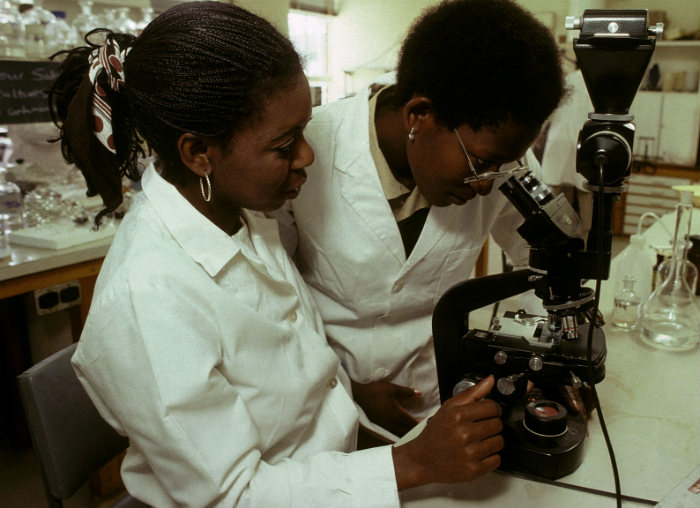By: Peter Okebukola
Send to a friend
The details you provide on this page will not be used to send unsolicited email, and will not be sold to a 3rd party. See privacy policy.
Political apathy is a big hurdle, but it’s still possible to rescue university S&T, argues Peter Okebukola.
Views of Africa as beleaguered by a multitude of problems have started to crumble, partly due to the many high-performing economies and to increasingly democratic governance.
Sadly, however, what has yet to crumble is the continent’s unacceptably low contribution to the global body of knowledge in science and technology (S&T).
Like mist in the early morning sun, Africa’s lead in S&T enterprises at the dawn of civilisation has largely vaporised. Thousands of years ago the continent was home to breakthroughs in metallurgy, the science of architecture, the calendar, numeration and medical systems. The urgent question now is how to re-awaken the sleeping giant in the twenty-first century through contributions to high-impact S&T research.
Too much teaching
There are at least four factors that explain the weak contributions of African universities and scholars to scientific literature. Chief among these is the slack political will to implement grand plans to help universities contribute to the knowledge economy through research, especially in S&T.
“Africa’s contribution — in terms of scholarly journal articles published, patents secured and digital resources in S&T — can be scaled up significantly if it ‘sharpens its teeth’ in five areas.”
Peter Okebukola
Politically, leaders are more motivated by the political stories they can tell with development plans than by implementing plans in universities, despite the visible impact on development that this would have.
This weaves into the second factor: the under-resourcing of universities. Low levels of grants and investment in research infrastructure have slowed the wheel of progress.
The third factor is the weakening capacity of young African scholars to conduct research using modern techniques and methodologies — and, similarly, of old scholars to let go of dated work habits.
Add the disproportionately heavy engagement of African scholars in teaching rather than research — due, among other things, to surging enrolment — and you have a cocktail that undermines their ability to contribute to global science.
Progress is possible
But it doesn’t have to be this way. In ten years’ time, Africa’s contribution — in terms of scholarly journal articles published, patents secured and digital resources in S&T — can be scaled up significantly if it ‘sharpens its teeth’ in five areas.
The first is capacity building. African Union member states should draw from regional, sub-regional and national funds for S&T research to support annual, intensive training workshops on contemporary research techniques.
It can be argued that this is a huge task given the number of scientists and scientific techniques, yet it is important to begin with small steps and scale up.
Such capacity-building efforts have been dotted all over Africa in the past five years, but with limited impact on contributions to global research. We need to change track and first target the training towards where capacity is weakest.
Lagos State University, in Nigeria, experimented with this and anecdotal evidence shows a positive impact on publications in high-impact journals. In 2012 it initiated the Science and Technology Education Research Group: a capacity-building project involving budding scientists, most with masters and doctorate degrees. They were mentored weekly, by award-winning scientists, in modern research methods including data gathering and “nextgen” analysis techniques.Payment to publish
Enhancing online access to scientific literature is the second step. Universities can reduce the cost of bandwidth through negotiations with internet providers. Nigeria and several other countries have reduced costs with support from external agencies and donors. But access is still inconsistent — interventions need to be backed by legal provisions that will guarantee affordable bandwidth for uninterrupted, high-speed internet.
The third step is to establish a national and institutional system in which African scholars are offered incentives to contribute to the global literature. This is paying huge dividends in some African countries.
Ghanaian, Nigerian and South African universities have offered financial rewards or funding guarantees for papers published in high-impact journals, as well as institutional and national ‘best researcher’ awards. Although other factors may also be contributing to their success, those universities, such as Covenant University in Nigeria, are achieving better rankings for research.
The fourth step is to foster links between African research networks in S&T and similar networks in Asia, Europe and North America, in order to build capacity in implementing a common agenda. Although country and regional priorities differ, there is common ground in research on issues that affect all humanity such as climate change and cures for cancer and HIV/AIDS.
Fifthly, universities should encourage a social media colony of African researchers to network and foster collaborative research around cross-cutting themes. This can be done through the Association of African Universities and the Global University Network for Innovation.
We should not underestimate the degree to which weak political will is going to hinder achieving these recommendations. However, over the past ten years, the African Peer Review Mechanism of the New Partnership for Africa’s Development (Nepad) has boosted the will of governments to deliver on promises through good governance.
These reforms should now steam ahead.
Peter A. Okebukola is Professor of Science and Computer Education and currently Chairman of Council, Crawford University, Nigeria. He is winner of the 1992 UNESCO Kalinga Prize for the communication of science and former Executive Secretary of Nigeria’s National Universities Commission. He can be contacted at [email protected]
This piece is part of the Africa’s PhD Renaissance series funded by the Carnegie Corporation of New York.
References
[1] Financing Higher Education in Africa (World Bank, 2010)














